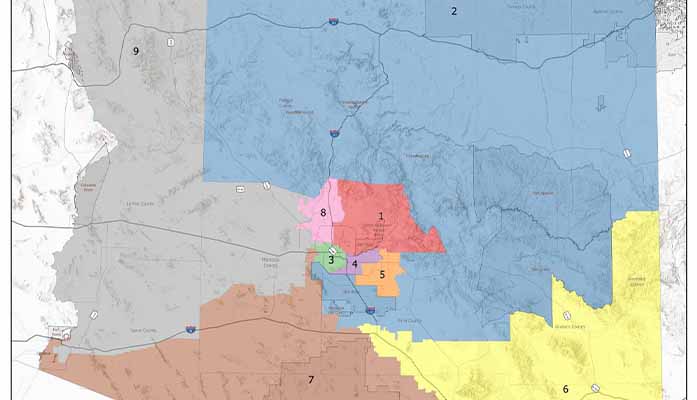
by Terri Jo Neff | Dec 23, 2021 | News
By Terri Jo Neff |
The Arizona Independent Redistricting Commission (AIRC) adopted two maps on Wednesday that will define the state’s 9 Congressional and 30 Legislative districts for the next decade starting with 2022 elections.
But getting to that final vote involved some of the most contentious negotiations in the months-long redistricting process, and sent the commissioners into an executive session with their legal counsel. It was also marked by the AIRC’s two Democrats voting against ensuring the district numbering system follows state law.
Every decade the state’s congressional and legislative districts have to be redrawn based on the latest census population data and several goals, such as district shape, geographical features, respect for communities of interest, compliance with the federal Voting Rights Act, and potential competitiveness.
The fact Arizona has more registered Republicans than Democrats (and more registered non-party “Independent” voters than Democrats) also comes into play.
Wednesday’s approval of Arizona’s new Congressional District (CD) map -officially known as version 13.9- went smoothly enough in the morning. The map was unanimously approved by the commission’s two Republicans -David Mehl and Douglas York- and the two Democrats -Derrick Watchman and Shereen Lerner -along with Independent Chairwoman Erika Neuberg.
Under Arizona’s current CD map, five districts are represented by Democrats. But historical voting data shows the newly drawn CDs will give Democrats a partisan advantage in only three districts.
Republicans will now have a partisan advantage in four of the new districts and a negligible advantage in a fifth. The other CD is considered a toss-up.
However, once that vote was taken discord took over as the AIRC considered the makeup of the final Legislative District (LD) map.
The census data works out to approximately 238,000 residents for each of the 30 LDs, although state law allows a little give and take. All of the commissioners have proposed various revisions to draft maps since the process started in the spring, and it has not been uncommon for small changes to be proposed to a district boundary.
For example, Mehl and York were willing Wednesday to approve a tweak to the district boundaries of the Flagstaff – White Mountain area at the suggestion of Watchman and the Navajo Nation. Meanwhile, Lerner sought to change LD2, which represents a small portion of Maricopa County.
Lerner, who wanted to reduce the Republican advantage in the LD2, appeared to get frustrated with the lack of progress she was making. At one point she questioned the motives behind her colleagues’ consent to the Flagstaff – White Mountains change, suggesting the Republicans agreed to the revision due to improper partisan interest –to benefit a current lawmaker.
A closed door meeting was called with the AIRC’s attorney, after which the commissioners continued debating Lerner’s various changes for LD2. Then Mehl and York told Neuberg that if LD2 was changed, they wanted to revisit the boundaries of LD13, another district in Maricopa County.
The posturing did not set well with Neuberg. “I don’t have an appetite to go back and reopen each and every deliberative process we’ve done on each side,” the chairwoman said.
Neuberg eventually voted with the two Republicans to approve LD map version 16.1 once she recognized the Democrat commissioners were not going to change their position.
But the disharmony continued, carrying over into what should have been an obvious unanimous vote – to renumber LD5 on the final map to LD1 to comply with a state law which requires the LD representing Prescott to be LD1. Lerner and Watchman inexplicably voted against the motion.
The maps must still be formally certified by Arizona Secretary of State Katie Hobbs. There is also the possibility of legal challenges to one or more of the AIRC maps, particularly the Voting Rights Act considerations for Hispanic / Latinos and Native Americans.
Another concern is whether the various districts adequately match Citizen Voting Age Population by Race and Ethnicity data from the U.S. Census Bureau.
Previous legal challenges have led to the narrowing of what a court can consider. A court review can determine whether the AIRC followed the constitutionally mandated procedure and whether the AIRC adopted a final plan that satisfies substantive constitutional requirements.
If a judge were to order any changes to the process or a specific map, such a change could require tweaks to one or more other maps.
The final maps can be viewed here

by Corinne Murdock | Dec 22, 2021 | Education, News
By Corinne Murdock |
Arizona law affords students forced to quarantine by their schools for COVID-19 the right to court-appointed counsel at the expense of the state, according to Attorney General Mark Brnovich. In an opinion issued last Friday, Brnovich responded to an inquiry from State Senator Kelly Townsend (R-Mesa) on the issue.
The attorney general explained that schools relying on county health department quarantine or isolation protocol must also adhere to the requirement of counsel outlined in the same law:
“The court shall appoint counsel at state expense to represent a person or group of persons who is subject to isolation or quarantine pursuant to this article and who is not otherwise represented by counsel,” reads the law. “Representation by appointed counsel continues throughout the duration of the isolation or quarantine of the person or group of persons. The department or local health authority must provide adequate means of communication between the isolated or quarantined persons and their counsel.”
The law also stipulates that legal counsel must be acquired at state expense and last the duration of the isolation or quarantine.
In reference to mandatory quarantines for students exposed to COVID-19, Brnovich referenced the authority cited by the Maricopa County Department of Public Health (MCDPH) in their letter to communities in August. The letter cited MCDPH authority for student quarantines came from a statute which, in turn, cited the two statutes outlined by Brnovich granting legal counsel.
“When a county health department or public health services district is apprised that infectious or contagious disease exists within its jurisdiction, it shall immediately make an investigation. If the investigation discloses that the disease does exist, the county health department or public health services district may adopt quarantine and sanitary measures consistent with department rules and sections 36-788 and 36-789 to prevent the spread of the disease. The county health department or public health services district shall immediately notify the department of health services of the existence and nature of the disease and measures taken concerning it.”
Brnovich concluded that parents may seek a court order to lift the quarantine immediately, which would initiate the appointment of state-provided legal counsel to the student. A court would have 24 hours to hear the case, and 48 hours to submit its ruling. Counsel would also be available for parents petitioning to change quarantine conditions. In that case, a court would have 10 days to hold a hearing.
“[U]nder MCDPH’s quarantine requirements, which appear to be issued pursuant to A.R.S. § 36-788, MCDPH, through public schools, is mandating student quarantines without a court order. Once a parent or guardian receives the MCDPH letter requiring quarantine, the parent or guardian is entitled […] to immediately seek a court order lifting the quarantine,” wrote Brnovich. “And once a parent or guardian requests court review, A.R.S. § 36-789(M) requires the court to appoint counsel for the student at state expense. Similarly, if a parent or guardian files an action on behalf of the student challenging the conditions of a quarantine, the court is required to appoint counsel for the student at state expense.”
The attorney general noted that Arizona law doesn’t necessarily define “state expense.” He opined that the cost of counsel could fall on county health departments.
That wasn’t Kelly’s only request for Brnovich’s legal opinion as of late. The state senator requested Brnovich’s opinion on religious tests and denial of religious exemptions by employers.
An answer on Kelly’s latest question has yet to be published.
Corinne Murdock is a reporter for AZ Free News. Follow her latest on Twitter, or email tips to corinne@azfreenews.com.

by Terri Jo Neff | Dec 22, 2021 | News
By Terri Jo Neff |
Citing the importance of growing Arizona’s international presence, House Speaker Rusty Bowers hopes a new Ad Hoc Committee on International Affairs will enhance trade opportunities while also strengthening border security.
“The world is an ever-changing place, and it’s important that the State of Arizona be proactive to attract more commerce, education and culture to this beautiful state,” Bowers said this week in announcing formation of the ad hoc committee.
The committee co-chaired by Tim Dunn (R-LD13) and Rep. Cesar Chavez (D-LD15) will organize visits and joint events in Arizona with international dignitaries, while identifying and working with outside organizations to strengthen Arizona’s international relationships. Committee members will also conduct hearings related to foreign trade, international affairs, and border security.
“Whether it be trade, border security or tourism, this committee will be a key force in making Arizona safer and more prosperous,” said Dunn, an agri-businessman who chairs the House Committee on Land, Agriculture & Rural Affairs.
According to the Observatory of Economic Complexity, Arizona had $1.9 billion in trade exports and $2.38 billion in trade imports in September 2021. Between September 2020 and September 2021, exports increased by $327 million (20.7 percent) while imports increased by $221 million (10.2 percent).
For Chavez, international relationships are critical for growing the state’s business, trade, and education sectors.
“I’ve always believed that Arizona is the State of Opportunity because of what can be accomplished in a bipartisan manner,” Chavez said. “Through the work of this ad-hoc committee, I’m certain that we’ll give Arizona its well-deserved global presence.”
Dunn and Chavez will be joined on the committee by Reps. Regina Cobb (R-LD5), Diego Espinoza (D-LD19), Alma Hernandez (D-LD3), Steve Kaiser (R-LD15), Lorenzo Sierra (D-LD19), and Justin Wilmeth (R-LD15).

by Corinne Murdock | Dec 21, 2021 | News
By Corinne Murdock |
Flagstaff City Council will consider requiring all single occupancy public restrooms to be gender-neutral. Affected restrooms would be those in city-owned buildings designed for one person, a family, or assisted use.
If enacted, the affected restrooms would be required to have “nongendered signage.” Instead, signs would read: “gender neutral,” “all gender,” or “restroom” without reference to a specific gender.
The Commission on Diversity Awareness characterized the change as equitable and ensuring safety for “gender non-conforming persons.” The commission also urged the council to recommend gender-neutral restrooms for all others not owned by the city.
The proposed push for gender-neutral restrooms arose out of the city’s application of the Municipal Equality Index: a metric designed by the Human Rights Campaign, the largest LGBTQ activist and lobbying group in the country. The index measures from 0 to 100 the inclusivity of laws, policies, and services within five categories: non-discrimination laws, municipality as an employer, municipal services, law enforcement, and leadership on LGBTQ equality.
Flagstaff scored 88 out of 100. They lost points in areas related to housing, health care, conversion therapy, youth bullying prevention, general resources, and all-gender facilities.
Some private facilities took the step toward gender-neutral accommodations years ago. The Flagstaff YMCA changed its single occupancy restrooms into gender-neutral ones in 2016 after a young transgender male lodged a complaint. The operations director received Northern Arizona University (NAU) LGBTQIA’s Ally of the Year award. The director reported that the sign change impacted the transgender male so profoundly that the parents cried over it. NAU established gender-neutral restrooms in 2015.
The site refugerestrooms.org lists the location of gender-neutral restrooms on Flagstaff and nationwide. The restroom locator service also comes in the form of an app.
The city commission discussed the policy proposal on Tuesday.
Corinne Murdock is a reporter for AZ Free News. Follow her latest on Twitter, or email tips to corinne@azfreenews.com.

by Corinne Murdock | Dec 21, 2021 | News
By Corinne Murdock |
Fully vaccinated and boosted Southwest Airlines CEO Gary Kelly caught COVID-19 a day after insisting during last Wednesday’s Senate hearing that masks don’t offer much protection against the virus on planes. Kelly’s spokespersons reported his symptoms as minimal.
“I think the case is very strong that masks don’t add much, if anything, in the air cabin environment,” said Kelly. “It’s very safe and high-quality compared to any other indoor setting.”
Planes rely on a filtration system that the Defense Department reported as making the risk of transmission low.
Surgical and cloth masks have limited potential for preventing aerosolized COVID-19 particles from potentially being breathed in or out by the wearer. Breathing and talking emit particles about the size of 1 micron. COVID-19 alone tends to be around .1 microns in size, ranging from as small as .06 microns to .14 microns; surgical masks can filter out particles sized at 2.5 microns or greater. Their greatest effect is to block larger respiratory droplets containing COVID-19, such as those within coughs or sneezes that are typically 5 microns or bigger.
N95 masks may provide greater efficacy because they’re rated to filter out 95 percent of particles sized .3 microns or greater.
Following the hearing, Kelly released a statement reiterating his support for the federal mandate for masks on planes.
Kelly tested negative for the virus multiple times prior to the hearing.
American Airlines CEO Doug Parker and United Airlines CEO Scott Kirby sat on either side of Kelly at the hearing. Spokespersons for both companies confirmed that both CEOs tested negative on Friday.
Corinne Murdock is a reporter for AZ Free News. Follow her latest on Twitter, or email tips to corinne@azfreenews.com.

by Corinne Murdock | Dec 20, 2021 | News
By Corinne Murdock |
Recent IRS filings revealed that Arizona received nearly $5.17 million during the 2020 election from the Center for Tech and Civic Life (CTCL), pumped with over $350 million from Facebook founder Mark Zuckerberg to funnel into election offices nationwide. The Zuckerberg funds were intended to provide COVID-19 relief; in large part, they funded controversial election methods like ballot drop-boxes. The Capital Research Center (CRC) first announced the CTCL IRS filings.
The CTCL numbers concurred with AZ Free News reporting earlier this year on CRC data, which reported that CTCL spent just over $5 million in Arizona. In fact, the CRC estimate turned out to be slightly lower.
According to the IRS filings, CTCL’s biggest grant was Maricopa County at over $1.84 million. The runner-up grant amounted to over $950,400 awarded to Pima County. Several counties received slightly under or over half a million each: Navajo County received over $593,700, Apache County received nearly $589,700, Coconino County received over $524,500, and Pinal County received over $472,500.
Yuma County still received a six-figure grant: over $180,700. La Paz County was the odd man out with a $17,500 grant.
President Joe Biden won the following counties funded by CTCL grants: Maricopa (50.3 percent), Apache (66.2 percent), Coconino (60.9 percent), Pima (58.6 percent). Biden also won Santa Cruz (67.2 percent), which had no CTCL grants.
Pima County Supervisors Ally Miller and Steve Christy voted against certifying the 2020 election over the Zuckerberg grants, as Miller explained in an opinion piece published in the Arizona Daily Independent last month. The supervisors didn’t believe the grant money was helping to secure the election.
Of those counties he won, Biden flipped Maricopa from the 2016 election — which Hillary Clinton lost by over four points. He also earned about four percent more of the votes than Clinton in the counties they both won.
Biden lost the following counties funded by CTCL grants: Navajo (45.2 percent), Pinal (40.6 percent), and La Paz (30 percent). However, he lost by a smaller margin than Clinton did, gaining an average of two more points in both counties.
CRC’s reported grants varied slightly from those given in the filings: they reported learning of nearly $3 million to Maricopa County, over $806,000 to Pinal County, nearly $614,700 to Coconino County, and over $593,200 to Apache County. Their estimate of La Paz County’s grant was accurate. CRC didn’t have data on the grants awarded to Navajo, Yuma, or Pima counties.
AZ Free News reached out to Maricopa County about the grant total discrepancy. They didn’t respond by press time.
Corinne Murdock is a reporter for AZ Free News. Follow her latest on Twitter, or email tips to corinne@azfreenews.com.






